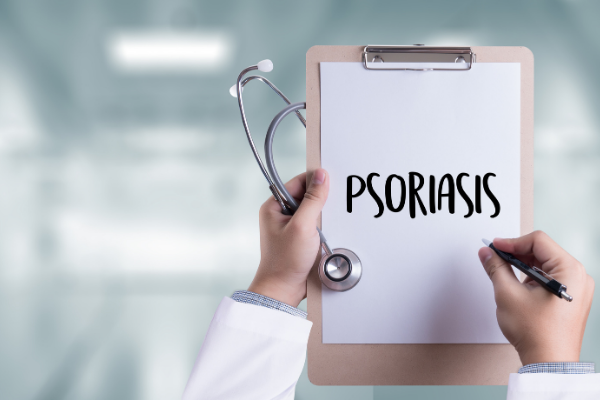Psoriasis is an Inflammatory autoimmune, chronic disease for the skin, which can change the skin into red bumpy patches with white scales?
The most common areas to be affected include the scalp, knees, elbows, and lower back of the human body. It is not a communicable disease, but you can get affected if you belong to the same family.
People who are suffering from psoriasis are at high risk of getting psoriatic arthritis.
Symptoms of Psoriasis
The symptoms and signs of psoriasis can differ from individual to individual. Below are few most common signs & symptoms of Psoriasis:
- Red skin patches usually covered with silver scales
- Cracked, dry skin which may burn or bleed
- Scaling spots on the skin
- Itching and soreness on the skin
- Swollen skin
- Ridged & thick nails
- Stiff Joints
Types of Psoriasis
Some most common types of psoriasis include:
Guttate Psoriasis
- It begins at a young age.
- Kids and children are more affected.
- It may cause red spots on the limb.
- It is triggered by a bacterial infection like strep throat, tonsils, skin injury, and stress.
Pustular Psoriasis
This is a rare form of psoriasis which can cause scaly & red skin with small pustules on the sole of feet and palm of hands.
Erythrodermic Psoriasis
In this form of psoriasis, you can feel fiery redness of skin & shedding of scales in sheets. It can be caused by severe sunburns, infections, & specific medicines.
Inverse Psoriasis
This psoriasis can affect skin folds, armpits, buttocks, under the breast. It can cause patches of red skin that can worsen with sweating and friction.
Causes of Psoriasis
Psoriasis is an Immune system problem that can cause our skin to regenerate at faster than normal rates. The two main causes associated with this disease are Genetics and Immunity.
Genetics
It is quite possible that a person can inherit this disease from Genes. Having a family member with psoriasis can increase your chances of inheriting that disease.
Immunity
We protect our body from any disease by having a strong immune system, which means the White blood cells in the body will fight if you come across a disease. But, when there is an improper immune system WBC starts attacking the skin itself, resulting in red rashes or burning skin.
Treatment of Psoriasis
Doctors generally choose treatment according to the type & status of psoriasis. The approach is usually, to begin with, mild treatments that commonly include ultraviolet light therapy also known as phototherapy, and topical creams.
The aim while treating the patient is to slow down cell turnover with the fewest negative effects on the human body.

